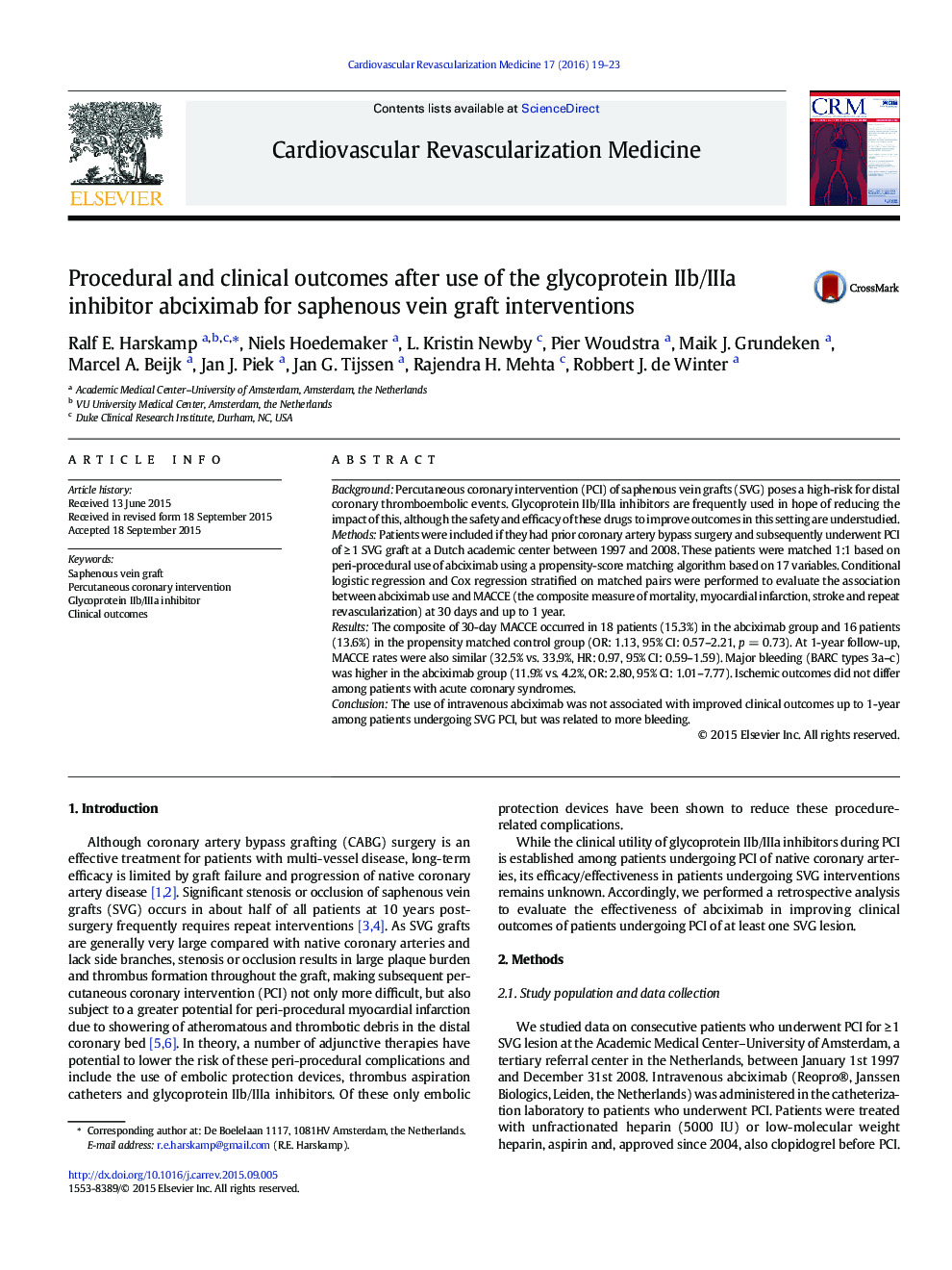| کد مقاله | کد نشریه | سال انتشار | مقاله انگلیسی | نسخه تمام متن |
|---|---|---|---|---|
| 2836885 | 1164864 | 2016 | 5 صفحه PDF | دانلود رایگان |
• PCI of SVG poses a high-risk for distal coronary thromboembolic events.
• Glycoprotein IIb/IIIa inhibitors are frequently used in an attempt to reduce this risk.
• We evaluated the safety and efficacy of abciximab (a glycoprotein IIb/IIIa inhibitor) using a propensity-score matched analysis of 236 patients at a large academic medical center.
• Thirty-day MACCE occurred in 15.3% of patients treated with abciximab and 13.6% in the controls (odds ratio of 1.13, 95% confidence interval: 0.57–2.12, p = 0.73). One-year MACCE was also comparable (32.5% vs. 33.9%, hazard ratio of 0.97, 95% CI: 0.59–1.59).
• Major bleeding (BARC definitions) was higher in the abciximab group (11.0% vs. 4.2%, OR: 2.80, 95% confidence interval: 1.01–7.77).
• From these findings we conclude that the use of abciximab is not associated with improved clinical outcomes, but on the other hand poses a significant bleeding risk in patients undergoing SVG PCI.
BackgroundPercutaneous coronary intervention (PCI) of saphenous vein grafts (SVG) poses a high-risk for distal coronary thromboembolic events. Glycoprotein IIb/IIIa inhibitors are frequently used in hope of reducing the impact of this, although the safety and efficacy of these drugs to improve outcomes in this setting are understudied.MethodsPatients were included if they had prior coronary artery bypass surgery and subsequently underwent PCI of ≥ 1 SVG graft at a Dutch academic center between 1997 and 2008. These patients were matched 1:1 based on peri-procedural use of abciximab using a propensity-score matching algorithm based on 17 variables. Conditional logistic regression and Cox regression stratified on matched pairs were performed to evaluate the association between abciximab use and MACCE (the composite measure of mortality, myocardial infarction, stroke and repeat revascularization) at 30 days and up to 1 year.ResultsThe composite of 30-day MACCE occurred in 18 patients (15.3%) in the abciximab group and 16 patients (13.6%) in the propensity matched control group (OR: 1.13, 95% CI: 0.57–2.21, p = 0.73). At 1-year follow-up, MACCE rates were also similar (32.5% vs. 33.9%, HR: 0.97, 95% CI: 0.59–1.59). Major bleeding (BARC types 3a–c) was higher in the abciximab group (11.9% vs. 4.2%, OR: 2.80, 95% CI: 1.01–7.77). Ischemic outcomes did not differ among patients with acute coronary syndromes.ConclusionThe use of intravenous abciximab was not associated with improved clinical outcomes up to 1-year among patients undergoing SVG PCI, but was related to more bleeding.
Journal: Cardiovascular Revascularization Medicine - Volume 17, Issue 1, January–February 2016, Pages 19–23
